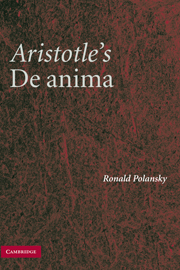Book contents
- Frontmatter
- Contents
- Preface
- List of Abbreviations
- Introduction
- COMMENTARY ON DE ANIMA: : Book 1
- COMMENTARY ON DE ANIMA: Book 2
- 1 Definition of Soul
- 2 What Is Life?
- 3 How Powers of Soul Are Distributed and United in the Soul
- 4 The Nutritive Faculty: Its Object and Subfaculties
- 5 Clarification of Being Affected, Living as Saving, and the First Definition of Sense
- 6 The Three Sorts of Sensible Objects
- 7 Vision, Medium, and Object
- 8 Hearing, Sound, and Voice
- 9 Smell and Odor
- 10 Taste Is a Contact Sense; the Tasteable
- 11 Touch, the Tangibles, and Sense as a Mean
- 12 Definition of Sense and Whether Sensibles Affect Nonperceiving Bodies
- COMMENTARY ON DE ANIMA: Book 3
- Bibliography
- Index
8 - Hearing, Sound, and Voice
Published online by Cambridge University Press: 18 December 2009
- Frontmatter
- Contents
- Preface
- List of Abbreviations
- Introduction
- COMMENTARY ON DE ANIMA: : Book 1
- COMMENTARY ON DE ANIMA: Book 2
- 1 Definition of Soul
- 2 What Is Life?
- 3 How Powers of Soul Are Distributed and United in the Soul
- 4 The Nutritive Faculty: Its Object and Subfaculties
- 5 Clarification of Being Affected, Living as Saving, and the First Definition of Sense
- 6 The Three Sorts of Sensible Objects
- 7 Vision, Medium, and Object
- 8 Hearing, Sound, and Voice
- 9 Smell and Odor
- 10 Taste Is a Contact Sense; the Tasteable
- 11 Touch, the Tangibles, and Sense as a Mean
- 12 Definition of Sense and Whether Sensibles Affect Nonperceiving Bodies
- COMMENTARY ON DE ANIMA: Book 3
- Bibliography
- Index
Summary
Color vision contributes greatly to the case for a sense medium. Hearing tests the case. Its object, sound, seems to travel through the air, so it is unlikely to be an affective quality of some substratum, as color is such a quality of a surface. Thus sound may well be that horror for Aristotle, an effluence. And bodies striking each other set up motions in air or water, that is, in the medium, but sound is heard rather than these motions. In this way Aristotle's realism, that perception of proper sensibles perceives things just as they actually are, is seriously tried by hearing because sound rather than the motion is heard. He will meet these challenges head on.
Commentators observe that the treatment of hearing and sound is more thorough than some of the others, and this is due to sound's seemingly different status from the other proper sensibles. Only by clarifying the origin of sound can Aristotle reflect upon what sound is and its medium, thereby handling the mentioned difficulties. Not until the De sensu does Aristotle discuss the origin of the other sensibles – except for tangibles in On Generation and Corruption 329b5ff. and Meteorology 340b5ff. and 385a1ff. – but having treated sound here in ii 8, he need say little in De sensu about its origin.
- Type
- Chapter
- Information
- Aristotle's De AnimaA Critical Commentary, pp. 285 - 301Publisher: Cambridge University PressPrint publication year: 2007



